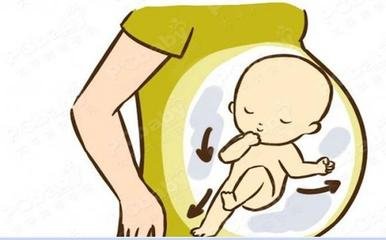For the first time, pregnant women feel that the baby kicks in the abdomen will surprise her. This will make the mother suddenly feel that the fetus is growing up in the belly, but why does the fetus kick the mother's stomach?
An expert said in an interview that although the fetus has a small space for movement in the uterus, their kicking is crucial for the development of the baby's bones and joints. According to a review article published in the Journal of Obstetrics and Gynecology Ultrasound, the movement of the fetus in the uterus was the first 7-week period when they slowly bent the neck. As the baby grows, they gradually add more movements, such as snoring, yawning, and sucking fingers. But until the 16-18 weeks of pregnancy, the fetus becomes stronger, and the mother will feel some larger movements of the fetus, such as kicking and punching.
The fetus also needs to exercise
Niaf Nolan, a bioengineer at Imperial College London, said: "A complete field of research is dedicated to figuring out whether the fetus can control its movements, or whether these movements are only a conditional reflex. It is likely to be pure conditioned reflex, but the subsequent movements become more coordinated. It is likely that the brain controls the amount of exercise and exercise time.” The conditioned reflex behavior of the fetus in the mother's abdomen originates from the spinal cord and does not require brain information input.
Scientists may not be sure whether these movements are voluntary or involuntary, but Niaf says the study clearly shows that exercise is very important to the fetus. “The baby needs more exercise after birth to maintain good health, especially their bones and joints,” she said. In a review report published in the European Journal of Cells and Materials, Niaf describes the lack of fetal movement. How to cause a variety of congenital diseases, such as: joints become shorter, bones are thin and prone to fractures.
For pregnant women, they are very curious to know if the baby in the abdomen is active or not active enough. Niaf said: "There is no fixed normal fetal movement during pregnancy. Pregnant women are told by doctors to pay attention to the significant changes in fetal movement. In fact, this is a very vague suggestion, but this is the best advice during pregnancy. ”
This is because it is difficult for scientists to study fetal movement. The only way to measure fetal movement is in the hospital, and it can only be done for a short time at a time. To solve this problem, Niaf and her colleagues are working on a fetal activity monitor that allows pregnant women to wear monitors during normal daily activities. Currently, researchers have tested monitors for 44 pregnant women between 24-34 weeks of pregnancy and are able to accurately detect fetal respiration, panic movements and other common body movements. The results of these studies were published in the May issue of the American Public Library·Comprehensive magazine.
A study published in the 2001 issue of the Journal of Human Fetus and Newborn Movement found that boys may have more activity in the womb than girls, and that the male fetus grows to 20, 34, and 37 weeks than the female fetus. More activities in the department. But the number of samples in this study is very small, with only 37 fetuses, so Niaf and her colleagues have a hard time defining the relationship between fetal gender and fetal movement.
Fetal kicking action is strong and powerful
Niaf said that every pregnant woman will have a different feeling when the fetus starts kicking. For example, in the two pregnancies she experienced, she was more sensitive to fetal movements during the second pregnancy than the first pregnancy. She said: "I can always tell where my son's feet are, but I can't do this when I was pregnant with the first child." She suspected that the difference was probably due to the more stretched uterus muscles after the first pregnancy. This is a topic she is currently studying.
The most obvious fetal movement in pregnant women is kicking. A recent study by Niaf and colleagues shows that the strength of a 20-week-old fetus kick is 2 kg. When growing for 30 weeks, the strength of the fetus kick can grow to 4 kg, after that, the strength of the fetal kick will drop to 2 kg. Scientists say that as fetal development matures, their activity may decrease because their activity space becomes smaller.
But the action of the fetus in the uterus is not just a kick. At 15 weeks of development, the baby will also box, open and close his mouth, move his head, and suck his fingers. After a few weeks, the fetus will blink and close your eyes. But pregnant women only feel some of the main movements - kicking, punching, and even snoring.
Niaf said: "The fetus will also do 'breathing exercise', but the fetus does not actually breathe the air, but they will do the same thing, just breathing the amniotic fluid." She explained that the baby who does not exercise is breathing after birth. Difficulties arise because they do not form chest muscles during development. Feeling that the fetus moves and kicks in the womb may give the pregnant woman a very strange feeling, but this is only a sign of the healthy development of the fetus.





 Price is 8-20% Lower Than Other
Price is 8-20% Lower Than Other






